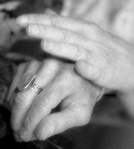AARP Hearing Center

Our Story Continues, part 2, by Dick Weinman, The Thin Edge of Dignity
Our first child, our son, Daniel, was conceived there. Funnily enough, Ginny and I, as a young, recently married couple, after only a few attempts, feared that we were unable to conceive a child. The kindly doctor smiled and said “give it more time.” None of us knew how the rain would fall.
******
Dan was born in 1956, during the year of my first teaching job at Bucknell University in Pennsylvania – the sole affirmative answer to the many letters Ginny had typed. Dan was the first of twelve children. Paul was born in 1958, while I was working on my PhD at Indiana University, to which we returned after the temporary job at Bucknell. We were in Athens, Georgia when we had Elisa in 1961. I was teaching at the University of Georgia after spending two years as a doctoral student at Indiana University. I had left I.U. not as a PhD, but as an ABD, as it was called then – All But Dissertation. I finally completed the dissertation while I was teaching at Iowa State University, in Ames. That’s where our three other children were born: Howard (1964), Rachel (1965), and Edward (1967).
From Iowa, we made the last part of our cross country journey - to Corvallis, Oregon, and Oregon State University. Ginny and I weren’t kids anymore, I was thirty-four; she was thirty-one, but neither were we silver haired. Our last six children were born in Corvallis. Sarah (1970), Aaron (1972), Adam (1974), Joel (1977), and the twins, Joshua and Jeremy (1978.)
We were blessed enough to raise and nurture all of them, and to cohere into a loving and united family.
I find it difficult to answer friends who ask “how did you manage?” Or people I meet for the first time, who say in amazement, “Twelve children! How did you do it?” Or some such bewilderment. They – especially the women – express empathy with my wife. Eleven pregnancies in twenty-two years! “Ouch!”
There is always the question of religious affiliation: “Are you Catholic?” No. “Are you Mormon?” No. My wife was hard wired to be a nurturer. She loved children. Hers and others. As a friend once told me, “Ginny was born to be a mother.”
Another question, I’m frequently asked is how did we parent?
There was no grand plan. As undergraduates, we sat across the heavy, mahogany colored, and scuffed table tops in Bloomington’s Stardust Café and assigned names to our three proposed children. Dan we called correctly; Paul, the second child was meant to be daughter, Deborah. Elisa, our third child, was supposed to be a boy, David. We not only miscounted, but the genders confounded our naming plan. Nature led the way. We followed.
We didn’t script and recite what we wanted our children to believe in; how they related to others; their compassion, sense of justice, moral imperatives, weren’t scripted and recited. We hoped our behavior would be instruction enough.
Despite the role it played in our wedding, religion wasn’t a dramatis personae in our family life’s drama. We raised our children neither Jewish nor Christian. We had a Christmas tree (which the children cut themselves at the tree farm) and a Menorah. We placed presents under the tree (in our large family, each child picked a name to gift), and lit the Chanukah candles. We went neither to church nor to temple. But we articulated and tried to inculcate the principles which underlie most religions. We parented non-religiously according to the values of religion.
The first thing a child in our large family learned was, in the words of John Donne, No man is an island entire of itself. Each is a piece of the continent, a part of the main. They learned that they were inter-connected. They learned to look after one another, to help one another. To They learned that to survive in a community of blood connected people was not try to best one’s siblings. It wasn’t necessary to compete, but to cooperate, rivals. Peace should prevail over internecine warfare.
Ginny and I tried to guide our children toward this harmony. While there have been cracks in our community, and personas have clashed, our children have bonded in familial love and care for and help to each other.
During the years of family building, Ginny and I went from young “kids,” inexperienced in the ways of the world and parenthood, to silver haired adults. We have nurtured, shaped, guided, and held together this mini-universe, these bearers of ourselves – our legacy.
That legacy is a family of twelve individualistic persons, each with his/her idiosyncrasies, reflecting the personality of their decade, demonstrating that even independent individuals can bond in unity.
That we have been successful, is illustrated by our children’s actions in these tenuous times in our experience as a family, now, in the middle of the 21 st century, when mine and Ginny’s lives have been catastrophically thrown off our journey. Our children have come to our rescue with their love and support, to aid us to continue our forward, if not damaged, passage through the closing years of our lives.































































